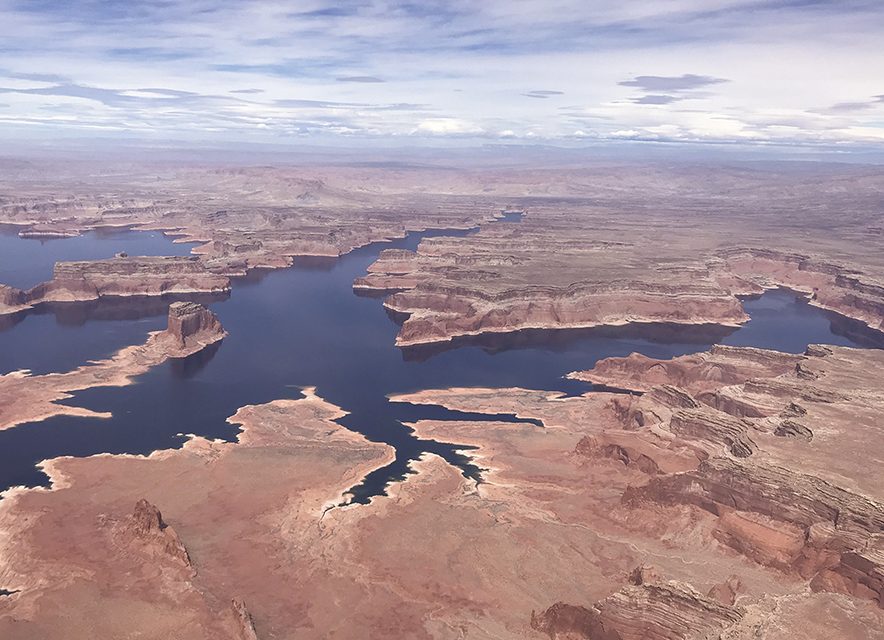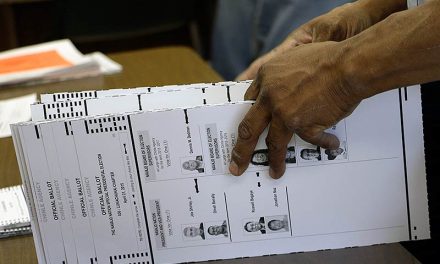
Utah Seventh Judicial District Court decree adjudicates Navajo water rights

Navajo Times | Krista Allen
A bird’s-eye perspective of Lake Powell from Naatsis’áán, Utah, shows Colorado River water levels. Arizona tribes, the Navajo Nation, the Hopi Tribe, and the San Juan Southern Paiute, signed a landmark settlement on July 17 to bring water and land to communities.
By Navajo Times
WINDOW ROCK – The Utah Seventh Judicial District Court on Jan. 31 determined and adjudicated all Navajo Nation rights to the use of surface and underground water in the state and fully incorporated the Navajo Nation/State of Utah Water Rights Settlement Agreement.
“I applaud this historic achievement,” President Buu Nygren said. “Securing the Nation’s water rights is one of my top priorities, and the court’s entry of the decree on Jan. 31, 2025, was the final step in securing the Nation’s water rights in Utah.
“Now that we have secured our water rights in Utah, I look forward to the state of Utah collaborating with the Navajo Nation to have Congress take swift action in passing the Northeastern Arizona Indian Water Rights Settlement Act,” he added.
Water rights negotiations began in 2003, and the Navajo Utah Water Rights Settlement Agreement was reached between the Navajo Nation and Utah in 2015. The Navajo Utah Water Rights Settlement was approved by Congress in 2020, and the act was finalized by the Navajo Nation, the state of Utah, and the U.S. Department of the Interior on May 27, 2022. The Utah Seventh Judicial District Interlocutory Decree determines and establishes the Nation’s right to use 81,500 acre-feet of water per year on its lands within Utah.
“The 25th Navajo Nation Council commends Utah’s Seventh (Judicial) District Court for affirming our water rights to 81,500 (acre-feet per year) from the Colorado River in Utah,” Speaker Crystalyne Curley said. “Our partnership with the state is rooted in respect and sovereignty, and we will continue working together to secure passage for the Northeastern Arizona Indian Water Rights Settlement Act in Congress.”
The Navajo Utah Water Rights Settlement Act authorized $210.4 million for water infrastructure development.
· $198.3 million for the Navajo Water Development Trust Fund
· $11.1 million for the Navajo Operation, Maintenance & Replacement Trust Fund
· $1 million for implementing the act
“This decree is a critical step towards getting access to the federal funding for the water projects in Utah pursuant to the settlement agreement,” said Jason John, the Department of Water Resources director.
Over 6,000 Diné reside in the Navajo Utah region, according to the 2020 U.S. Census. Approximately half of the households within this area don’t have clean drinking water and must haul water over vast distances. The other half have running water and indoor sanitation facilities.
Council Delegate Curtis Yanito said this is a significant win in securing water rights and future water access for Diné in Utah. It’s been a 36-year journey, and the Nation’s efforts have triumphed.
The Navajo Nation Department of Justice recognized the monumental document and celebrated the NUWRS interlocutory decree at the Feb. 11, 2025, Navajo Utah Commission meeting.
“The Navajo Utah Water Settlement decree signifies an important milestone … for the Navajo people in securing and protecting our water,” said Joelynn Ashley, the Navajo Nation Water Rights Commission chair. “I look forward to the passage by Congress of the Northeastern Arizona Indian Water Rights Settlement Act that will provide the delivery of safe drinking water to many Navajo families who continue to haul water on a daily basis. It takes a team to accomplish what is being pushed forward for the future of the Navajo Nation.”








 Highway 264,
Highway 264, I-40, WB @ Winslow
I-40, WB @ Winslow